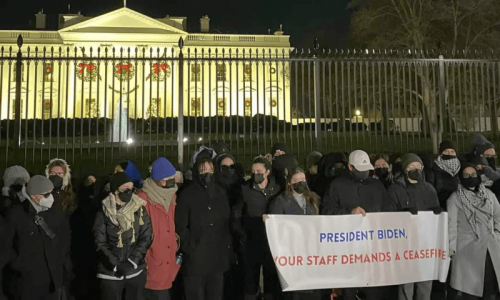US PRESIDENT Joe Biden seems to have put his personal credibility on the line by spelling out what he called a comprehensive three-phase Israeli proposal. He said “it is time to end this war” in Gaza and secure a “lasting ceasefire”. That fact alone ought to trigger hope, if not optimism.
As the contours of the proposal emerged in Biden’s statement to the media at the White House, many commentators pointed out that the deal wasn’t different from the one Hamas agreed to at the beginning of May, which was rejected by Israel. (The details of the deal on the table are covered in the news pages.)
As most of the diplomatic activity and negotiations take place away from the public eye, Biden’s statement, televised live across the world, suggested that prior soundings out of the parties may have happened and there was a good chance of the proposal being accepted.
The one major difference from the last time was that Joe Biden was sticking his own neck out and underwriting the agreement as he said the US, Qatar and Egypt will make sure that negotiations stay on track and that the parties to the conflict, ie, Israel and Hamas stay engaged. This meant a lasting ceasefire.
Even now if it can secure a ceasefire and keep a residual presence in Gaza, Hamas would not be a loser.
Minutes after the Biden address, Qatari sources confirmed to Al Jazeera that negotiators were in touch with Hamas to ascertain the latter’s reaction to the proposal. A little later, Hamas issued a statement saying they viewed the proposal “positively”.
Bizarrely, though the US president called it an Israeli proposal, Prime Minister Benjamin Netanyahu seemed to add some conditions to it. Equally strange was the fact that he has, on occasion, publicly distanced himself from his own negotiators.
It could be that for a far-right genocidal Israeli leader to say outright he was ready for a ceasefire before his stated goals for the (largely one-sided) war had been achieved, was too tall an ask. In fact, he is far from achieving his aim of total destruction and annihilation of Hamas and, brave words aside, may have to step back.
Any sane person would want this genocidal war to end and the hostages, both Israelis (numbering some 200) and Palestinians (several thousand), even if the latter are called ‘prisoners’, to be freed and reunited with their families.
But why has it taken the killing of some 40,000 Gaza Palestinians, including 14,000 children, the flattening of 80 per cent of Gaza, and the destruction of its infrastructure including schools, universities, hospitals, roads and civic services, for this proposal to finally have a chance of working?
Let’s take the players one by one. President Biden, just five months away from an election, is trailing in the battleground or ‘swing’ states, having angered and alienated many Blacks, Muslims, young voters and progressive Democrats by his unconditional support of Israel, which has translated into the export of billions of dollars’ worth of arms, bombs, ammunition and military equipment to the Zionist state.
Israel is said to have assured him at the start of its genocidal assault on Gaza — following last year’s savage Oct 7 attack on Israel by Hamas, which killed some 1,200 Israelis, including approximately 400 security personnel — that the war would be over well ahead of the US presidential election so that the voters would have forgotten about it by the time polling day came.
That didn’t happen. In fact, stories started to appear in some sections of the Israeli media that Netanyahu and his military commanders had clashed over the lack of clarity and direction in the military regarding the endgame of the Gaza campaign.
If the far-right coalition aimed to execute Nakba II and hoped that its brutal bombing campaign and the pain inflicted on the Palestinians would lead to mass migration from Gaza, the resilience of the Palestinians was staggering.
They faced Israel’s genocidal military campaign with fortitude, despite sacrificing more than anyone else in the 21st century. Their spirit to survive on their own land has remained unconquered. All this was happening before the eyes of the world as Israeli censorship and the blocking of foreign journalists’ access to Gaza failed because heroic local journalists valiantly reported the truth to the world. Over 100 of them were murdered in the line of duty.
As for Hamas, soon after Oct, it was offering to swap Israeli hostages for some Palestinian prisoners and a ceasefire. That was an unrealistic position to take immediately after its Oct 7 carnage in Israel, in which many civilians were also targeted. However, even now if it can secure a ceasefire and keep a residual presence in Gaza, it would not be a loser. The pain and suffering of Gaza could well be a decisive factor.
This may appear an overly simplified look at a very complex situation, but given time and space constraints here, a more in-depth analysis isn’t really possible and is beyond the scope of this piece.
As for Israel and Netanyahu, everyone knew they would have to apply the brakes if the US asked them to. Unlike past excesses committed by Israel in Gaza and the West Bank, this conflict was being beamed live to the world’s smartphones and creating revulsion at the genocidal policy.
Mounting international pressure and the brilliant South African case in the International Court of Justice and the International Criminal Court prosecutor’s decision to seek arrest warrants for Netanyahu, among others, may have evoked an arrogant and belligerent response from the Israelis, but it did gnaw away at their genocidal intent. Notwithstanding brave words and tough demands, the Israelis may be amenable to a deal at this point.
This isn’t to say a ceasefire is a foregone conclusion at this stage. However, it would be correct to believe this is the closest we have come to an end to hostilities in Gaza since last October. A free Palestine remains an elusive dream even as it remains the only guarantee of lasting peace in the Middle East.
The writer is a former editor of Dawn.
Published in Dawn, June 2nd, 2024















































